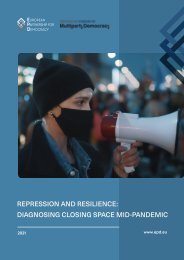Thinking Democratically: A Comprehensive Approach to Countering and Preventing Shrinking Space
Create successful ePaper yourself
Turn your PDF publications into a flip-book with our unique Google optimized e-Paper software.
6.<br />
Annexes<br />
Summaries of country case studies on shrinking democratic space<br />
6.1 Kenya<br />
In Kenya, the ruling party has primarily attacked civic space by employing legislative, political <strong>and</strong><br />
administrative strategies. Legislative strategies have attempted <strong>to</strong> chip away at constitutional<br />
guarantees such as freedom of media <strong>and</strong> freedom of association, through the amendments <strong>to</strong> the<br />
Kenya Information Communications Act 2013 <strong>and</strong> the Amendment bill <strong>to</strong> Statute Law, which sought<br />
<strong>to</strong> restrict the functioning of NGOs by capping foreign funding <strong>to</strong> 15% of an organisation’s <strong>to</strong>tal<br />
budget. Administrative strategies include the refusal <strong>to</strong> operationalise laws, the usage of old laws <strong>to</strong><br />
harass CSOs <strong>and</strong> organisational restructuring <strong>to</strong> inhibit NGOs’ capacity <strong>to</strong> hold the government<br />
accountable. Political strategies include the intimidation <strong>and</strong> usage of violence against CSOs <strong>and</strong><br />
associations, violently dispersing protests, <strong>and</strong> the suspension of CSO activities for allegedly failing<br />
<strong>to</strong> comply with regulations. It also includes hiring bloggers <strong>to</strong> spread negative messages about CSOs<br />
<strong>and</strong> threatening <strong>to</strong> withhold advertising revenue from media houses.<br />
<strong>Space</strong> for political contestation has so far not come under any serious threat from the state or any<br />
other ac<strong>to</strong>r in the political system. The closing of the space is, largely, a function of the party system<br />
characteristics that render it exclusive, unrepresentative <strong>and</strong> unaccountable <strong>to</strong> citizens. These party<br />
system characteristics include the leveraging of patronage powers of the presidency <strong>and</strong> abuse of<br />
incumbency by the ruling party; the opaque mobilisation <strong>and</strong> utilisation of resources by political<br />
parties; lack of internal party democracy; <strong>and</strong> mobilisation of support on the basis of ethnicity. They<br />
constitute the root causes of corruption <strong>and</strong> impunity, the instinct <strong>to</strong> limit contestation <strong>and</strong> the<br />
exclusion of marginalized groups.<br />
In the face of these systemic fac<strong>to</strong>rs limiting democratic space <strong>and</strong> proactive attacks on civic space,<br />
civil society, the judiciary <strong>and</strong> smaller political parties have been strong defenders of the rule of law<br />
<strong>and</strong> constitutionalism. Civil society has adopted multiple strategies <strong>to</strong> push back against the shrinking<br />
democratic space, including: mobilizing <strong>and</strong> networking; lobbying <strong>and</strong> advocacy; public litigation;<br />
52

















